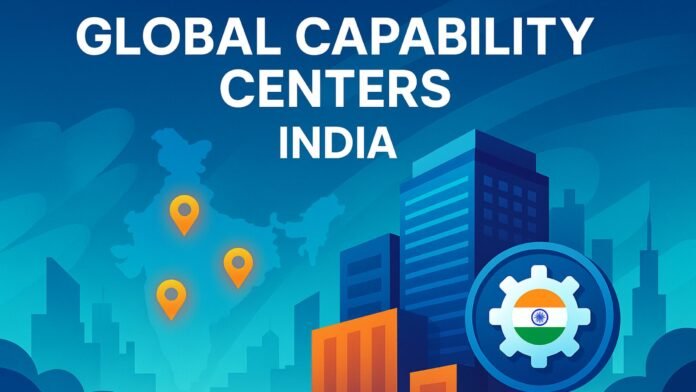India’s GCC Boom: A $200 Billion Opportunity for Startups and Innovation
India stands on the cusp of an economic transformation, fueled significantly by the burgeoning ecosystem of Global Capability Centers (GCCs). Once primarily seen as cost-arbitrage centers, these captive units of multinational corporations are rapidly evolving into sophisticated innovation powerhouses, and their projected contribution of up to $200 billion to the Indian economy by 2030 marks a monumental shift. This isn’t just about numbers; it’s about a fundamental redefinition of India’s role in the global business landscape, creating unprecedented opportunities for startup founders and innovators across the nation.
Finance Minister Nirmala Sitharaman recently underscored this potential, highlighting how GCCs are transitioning from mere operational back-offices to strategic hubs driving research, development, and high-value creation. For the aspiring and established founder, this evolution offers a fertile ground for collaboration, talent acquisition, and market disruption.
The Ascent of GCCs: From Cost Center to Innovation Catalyst
The journey of GCCs in India has been remarkable. From their nascent stages focused on support functions, they have matured into strategic assets, with nearly 50% of Fortune 500 companies now having a presence in the country. This isn’t a mere accident; it’s a testament to India’s deep and diverse talent pool, its cost-effectiveness (30-50% lower operational costs compared to the US, UK, and Australia), and a progressively supportive policy environment.
In 2024 alone, one new GCC was established every week, indicating the accelerating pace of this growth. This expansion is increasingly focused on high-value activities like engineering research and development, artificial intelligence (AI), machine learning (blockchain), cybersecurity, and product development. This strategic pivot signals that GCCs are no longer just executing; they are inventing, innovating, and leading global initiatives from Indian shores.
Why This Matters for Startup Founders: A Confluence of Talent, Technology, and Capital
For startup founders navigating the dynamic Indian ecosystem, the rise of GCCs presents a multi-faceted opportunity:
1. The Deepening Talent Pool and Skill Upgradation
India already boasts 32% of the global GCC talent, 28% of the world’s STEM workforce, and 23% of global software engineering talent. GCCs are voraciously hiring, often offering competitive salaries and advanced training in cutting-edge technologies. This means:
- Access to Highly Skilled Professionals: While competition for top talent remains, the sheer volume of skilled individuals being trained and upskilled by GCCs creates a broader talent pool for startups to draw from.
- Specialized Expertise: GCCs are becoming centers of excellence in AI, data science, cloud engineering, and more. This concentration of expertise fosters a knowledge-rich environment that benefits the entire ecosystem, including early-stage ventures.
- Reverse Brain Drain: High-quality opportunities within GCCs are increasingly encouraging Indian AI researchers and tech professionals to stay in the country, enriching the local talent landscape.
2. Collaboration and Co-Creation Opportunities
Many GCCs are actively seeking partnerships with nimble, innovative startups to co-create solutions and accelerate their innovation cycles. This presents a unique avenue for startups to:
- Gain Enterprise Validation: Partnering with a global corporation’s GCC can provide crucial validation for a startup’s technology or business model.
- Access Mentorship and Resources: GCCs can offer mentorship, access to their extensive networks, and even infrastructure or funding for promising collaborations.
- Solve Real-World Problems: Startups can align their solutions with the strategic challenges and digital transformation agendas of large enterprises, leading to meaningful impact and potential revenue streams.
3. Propelling Innovation and R&D
The shift of GCCs towards higher-value R&D work means India is becoming a global hub for technological advancements. This fuels a virtuous cycle where:
- Technology Proliferation: The cutting-edge technologies and best practices adopted by GCCs often trickle down, making advanced tools and methodologies more accessible within the broader startup community.
- Ecosystem Maturation: The presence of large, innovation-driven GCCs strengthens the overall tech ecosystem, creating a more robust environment for startups to thrive, secure funding, and scale.
- Niche Market Creation: As GCCs delve deeper into specialized areas, they open up new opportunities for startups to build complementary solutions or provide niche services.
The Road Ahead: Beyond Metros and Towards Strategic Depth
The Indian government is actively supporting this growth, emphasizing the expansion of GCCs beyond traditional Tier-1 cities into Tier-2 and Tier-3 locations. This decentralization aims to:
- Unlock New Talent Pools: Tap into a vast, untapped talent pool in smaller cities, ensuring more equitable distribution of economic opportunities.
- Foster Regional Ecosystems: Catalyze the development of tech infrastructure and startup ecosystems in emerging cities, creating new innovation hubs.
- Reduce Operational Costs: Offer even greater cost efficiencies for GCCs, making India an even more attractive destination for global companies.
Initiatives like simplified tax rules, faster approvals, and the development of specialized zones like GIFT City are designed to make India an undeniable magnet for GCC investments. For startups, this means the potential for broader geographical expansion and access to talent and resources in previously underserved regions.
Actionable Insights for Startup Founders
- Network Strategically: Actively engage with GCC leaders and professionals through industry events, incubators, and accelerators. Understand their pain points and identify collaboration opportunities.
- Focus on Niche Solutions: Instead of competing head-on, consider building specialized solutions that complement the core work of GCCs, especially in emerging tech areas like AI, cybersecurity, and advanced analytics.
- Leverage Tier-2/3 Cities: Explore setting up operations or talent acquisition efforts in Tier-2 and Tier-3 cities, where the talent pool is growing and operational costs can be lower.
- Embrace Upskilling: Continuously invest in upskilling your teams in the same advanced technologies that GCCs are prioritizing to remain competitive and attractive for partnerships.
- Understand Regulatory Landscape: Stay informed about government initiatives and policies aimed at supporting GCCs and the broader tech ecosystem, as these can offer significant advantages.
The projected $200 billion contribution of GCCs to the Indian economy by 2030 is not just a statistical milestone; it’s a powerful indicator of India’s evolving prowess as a global innovation hub. For startup founders, this isn’t a distant phenomenon, but a transformative wave offering unprecedented opportunities to build, scale, and contribute to India’s burgeoning tech narrative.
Are you a startup founder or innovator with a story to tell? We want to hear from you! Submit Your Startup to be featured on Taalk.com.








